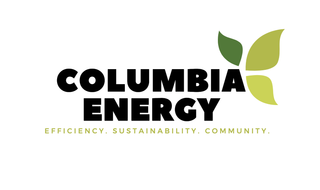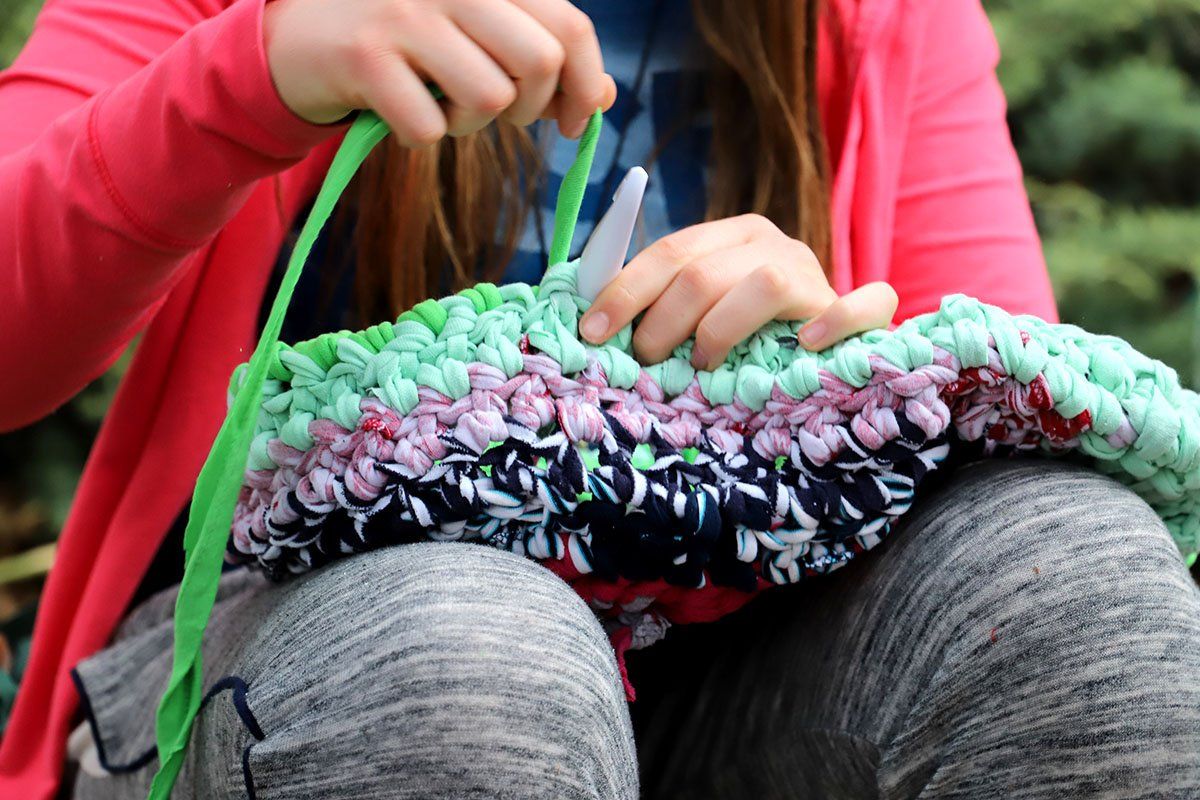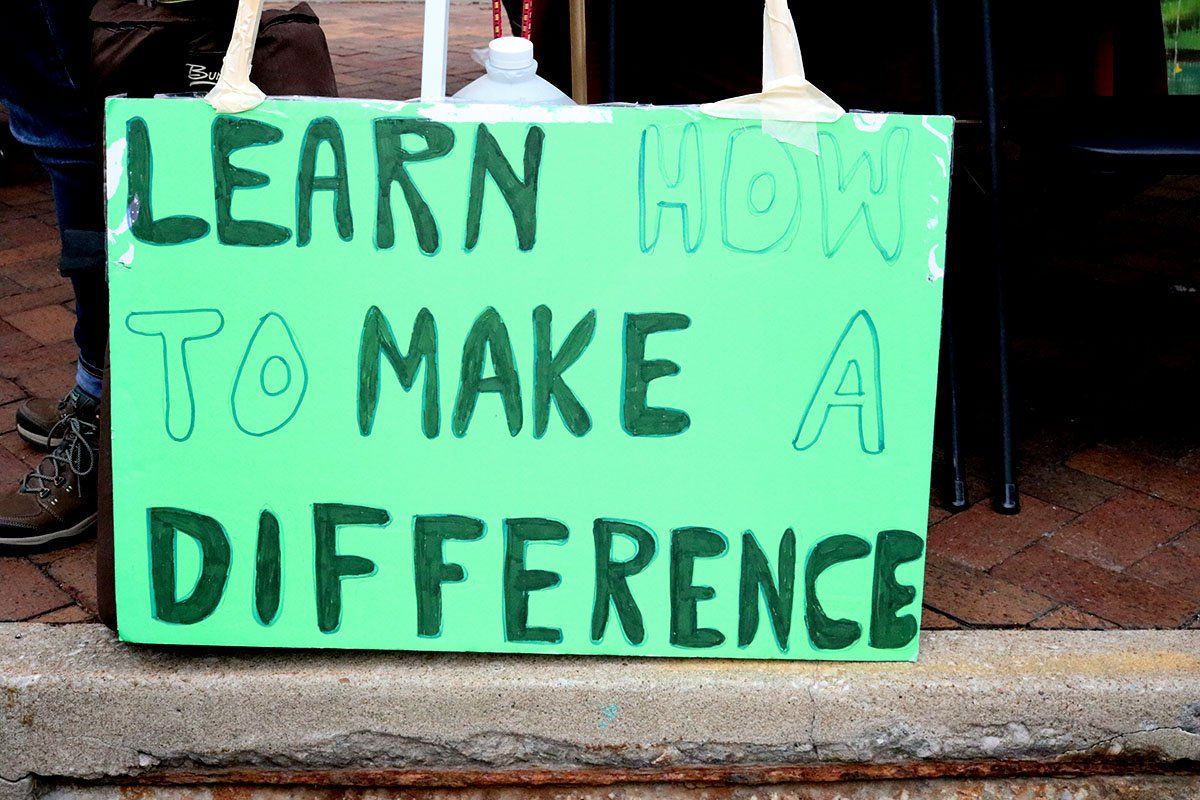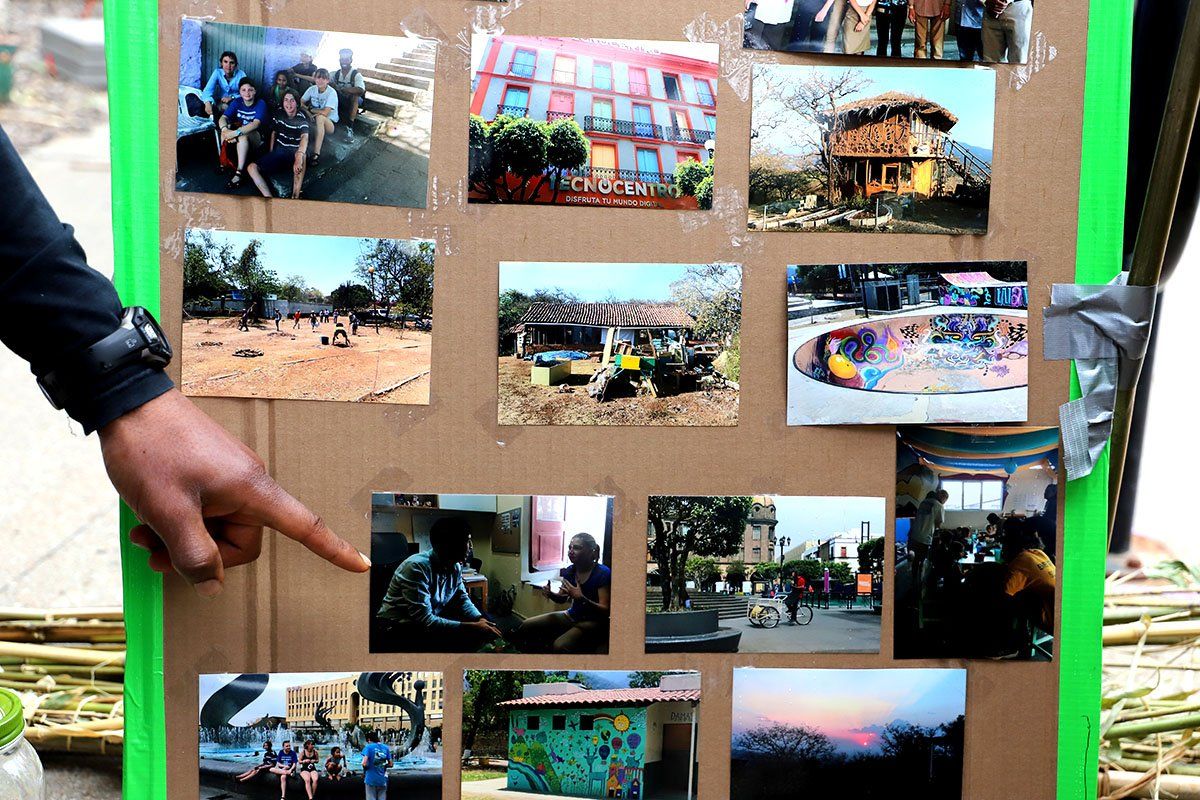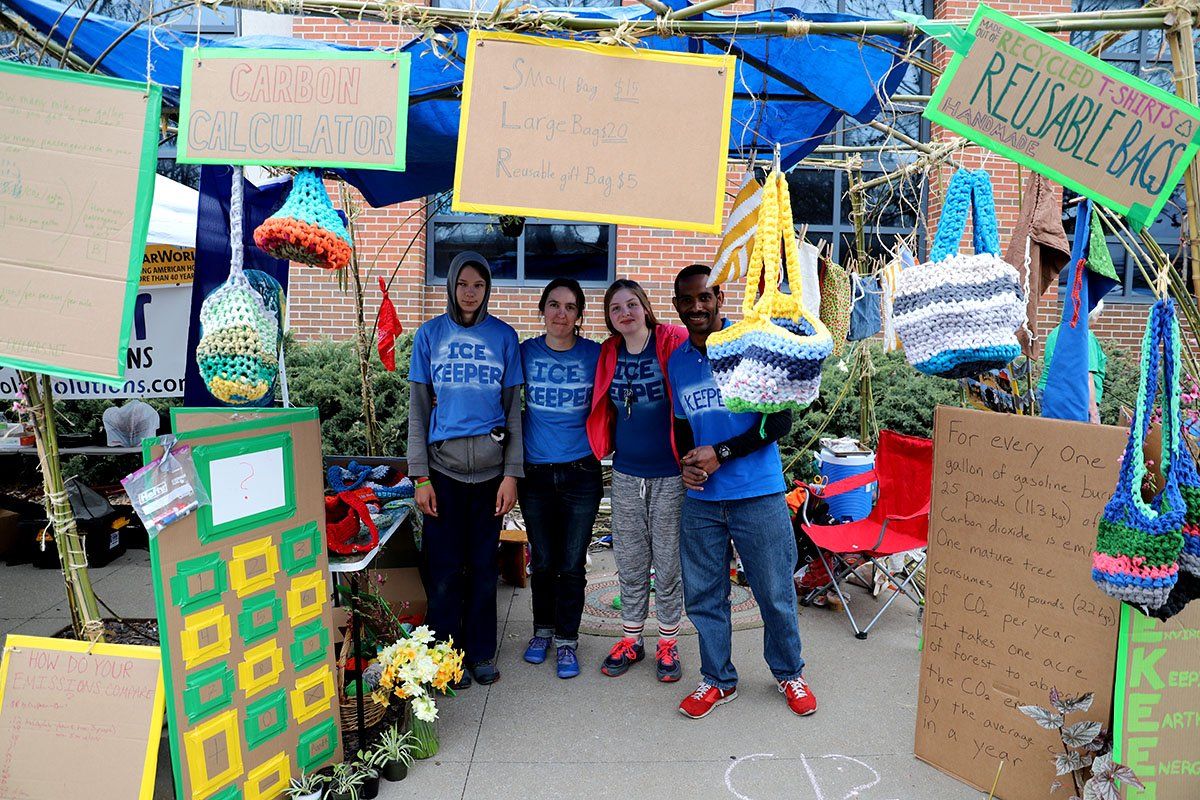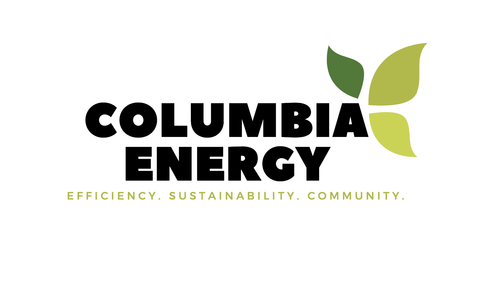SUSTAIN COLUMBIA
How a community implements sustainability for a greener tomorrow
Columbia, Missouri is a city that utilizes a variety of techniques to further sustainable lifestyles.
“It was refreshing,” Emily Durgan said, regarding the Earth Day 5K race she had just participated in.
Durgan is a citizen of the Columbia community and loyal observer of Earth Day.
For every other day of the year, she is involved with Missouri Solar Applications, a solar energy company that installs solar panels and solar systems in the Columbia area.
"The goal is really to make people in our community aware of renewable energy and renewable sources here in Missouri,” Durgan said.
From recycling centers to renewable energy, the Columbia community is one that implements a multitude of sustainable practices. In fact, within the entire Boone County area, Columbia residents make up nearly half of those who utilize the local recycling centers.
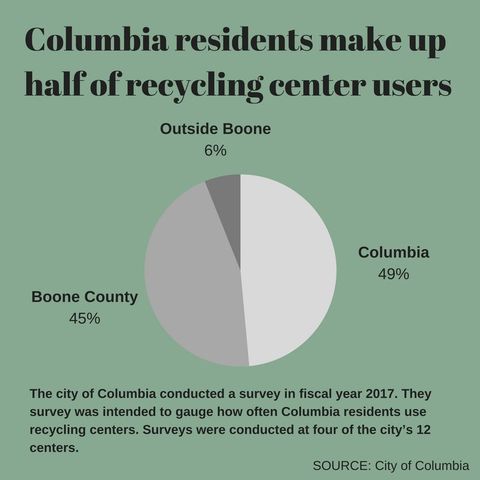
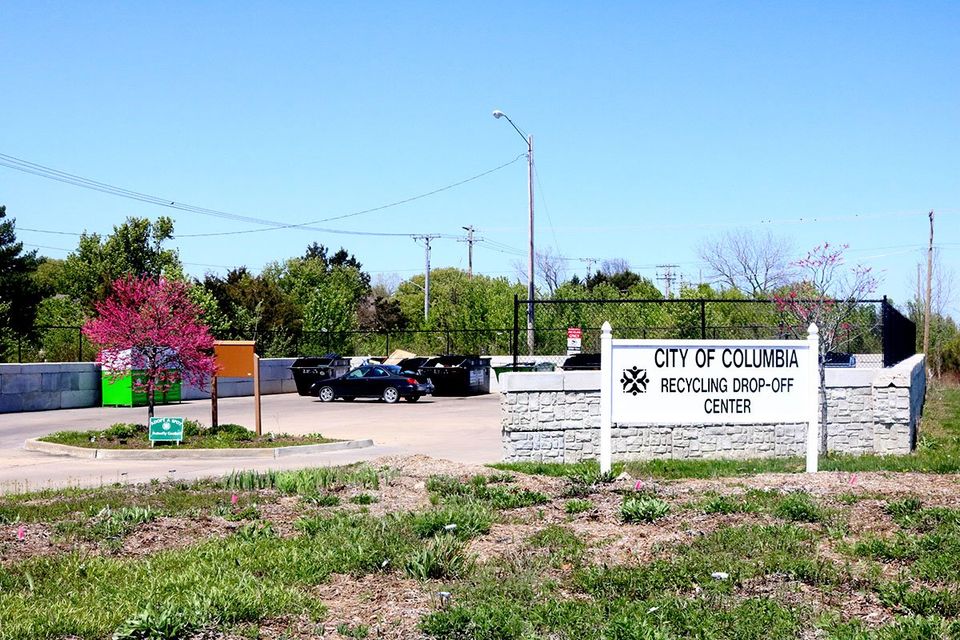
Photo by Emmy Lucas
Columbia residents unload their cars at the Columbia Recycling Drop-off Center, Sunday, April 29, 2018. The center has bins for containers including glass, plastic and aluminum, separate from fiber materials such as newspaper, cardboard and printer paper.
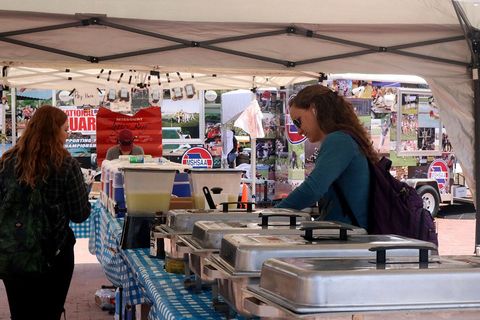
Photo by Emmy Lucas
A University of Missouri student grabs a bite to eat from Missouri Legacy Beef at the MU Campus Farmers’ Market, Thursday, April 26, 2018. Vendors set up on Lowry Mall on MU’s campus every Thursday afternoon to sell locally-grown produce, baked goods, grass fed beef and more.
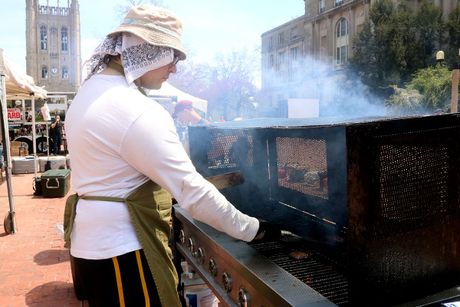
Photo by Emmy Lucas
Drew Scott, a Missouri Legacy Beef employee, grills burgers at the University of Missouri Campus Farmers Market on Thursday, April 26, 2018. “It’s all 100 percent, pure beef,” Scott said.
The Columbia Farmers Market, located at the Parkade Center, allows for local food to be easily and reliably accessed by the community. This organization hosts a “Farm-to-Table Dinner” that features a home-grown meal. All proceeds from the meal go back into the program to fund awareness and education about sustainable agriculture.
To celebrate the environment, the city of Columbia commemorates Earth Day with an annual festival. The Columbia Area Earth Day features eco-friendly vendors, music, a park for kids and accessible education on sustainable living. This allows for people to build connections not only with businesses, but with fellow likeminded members of the community.
To further education and communal connections, Mid-Missouri Peaceworks is a non-profit dedicated to educating the community about sustainable living. They are responsible for operating Peace Nook, a volunteer-operated community resource center that sells fair trade and environmental products with all proceeds funding the educational outreach of Peaceworks.
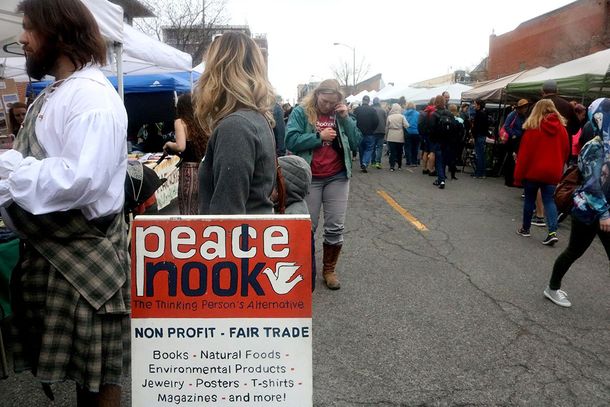
Photo by Emmy Lucas
Columbia residents gather around the Peace Nook booth at the Columbia Area Earth Day festival, Sunday, April 22, 2018. Peace Nook is a non-profit, volunteer-based community resource center. It is also a storefront, offering books, fair trade imports, natural foods, environmental products and more.
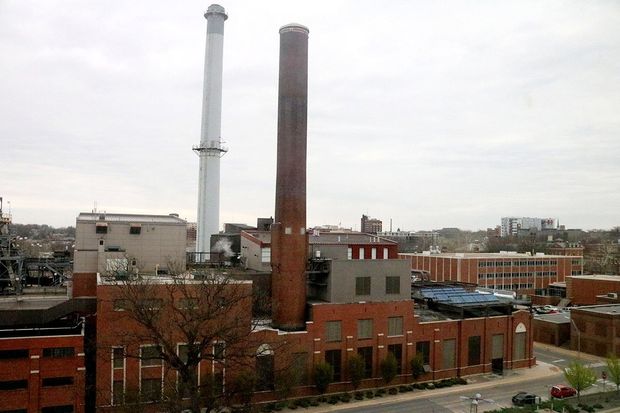
Photo by Emmy Lucas
The University of Missouri power plant creates energy, Sunday, April 22, 2018. MU production facilities operate around the clock, providing the campus with cost-effective and reliable utilities. The facility incorporates efficient combined cooling, heat and power (CCHP) utility production methods. CCHP methods include using steam and gas turbine generators to produce electricity. The combined heat and power systems allow the plant to produce a significant portion of campus electricity at nearly twice the efficiency of a conventional power plant, according to MU Campus Facilities.
Local real estate serves as a marker for sustainable living. Columbia residents spend accordingly when presented with home options that are environmentally-friendly and energy efficient. According to National Mortgage Professional, “sixty-one percent of real estate brokers surveyed by the trade group stated that consumers are interested in sustainability in their potential homes.”
An essential part of sustainability in homes is how the energy is actually produced. Columbia residents look more and more toward solar energy.
“The Midwest is finally having its solar boom,” Jennifer Rothchild, a sales manager for Sun Solar, said.
Sun Solar is a local solar contractor and energy efficiency contractor dedicated to making solar energy affordable and easy to obtain for Columbia residents.
“Solar is growing, the industry is growing very quickly. We employ as an industry nationally about 300,000 people,” Rothchild said.
Rothchild estimates that Sun Solar installs twenty-five to thirty solar systems a week.
There are Columbia businesses that while not centered on renewable energy or green power still do their part to be better for the environment. These businesses are making an effort to be “low-waste.”
One example, Nourish, a local cafe, is quoted as producing less than a single bag of trash most days as they recycle and compost. And, another, La Siesta, a local Mexican restaurant, has stopped giving out straws to customers as they are not biodegradable.
As arguably one of the largest facets of the community, the University of Missouri generates more renewable energy than any other university in the country, according to Utility Dive. Of the university’s total energy needs, 40 percent are made up of biomass, wind and solar energy.
While being functionally green, MU also fosters a community of students who run and maintain a variety of organizations and practices that promote environmental welfare.
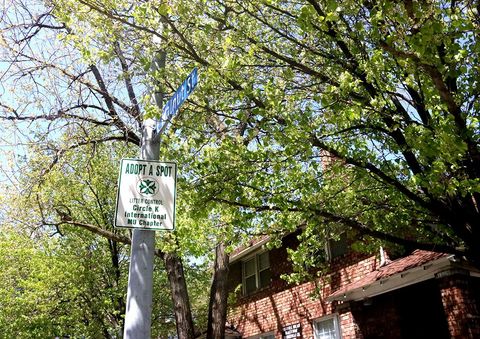
Photo by Emmy Lucas
An Adopt-a-Spot sign hangs on a light pole on East Walnut Street in Columbia, Missouri, April 29, 2018. As a citywide initiative, organizations can adopt a street to be responsible for trash cleanup on that street throughout the year. Circle K International, a service-based club at the University of Missouri, adopted East Walnut Street as its cleanup effort.
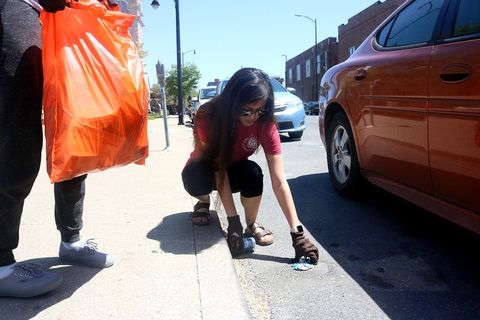
Photo by Emmy Lucas
Lauren Gann, a University of Missouri student and Circle K International member, picks up aluminum trash along Walnut Street in downtown Columbia, Missouri, April 29, 2018. “We try to come out here at least twice a semester as a club,” Gann said. Circle K International is a service-based MU club that volunteers at various events, including Adopt-a-Spot, a roadside trash cleanup.
The Mizzou Energy Action Coalition is one organization that successfully called for the university’s transition of burning coal to burning biomass. Currently, the group works through petitions and events to get MU to divest from fossil fuel companies.
Sustain Mizzou is another group with environmentally-driven goals. They have a variety of active projects year-round, such as beekeeping that takes place in Eckles Butterfly Garden, a food drive that focuses on local produce being distributed back into the community and an electronic waste drive that helps to properly recycle unused electronics.
MU also employs the use of electric shuttles throughout campus. In use since December 2015, the battery-powered shuttles are an effort to not only reduce air and noise pollution, but to also save money in place of fuel costs.
The Columbia community is committed to sustainable living not only in large efforts like the Earth Day event and local food drives, but in small changes such as recycling and choosing to use less plastics.
“We’re saving trees, reducing emissions, so from a sustainability standpoint, it’s extremely beneficial,” Rothchild said.
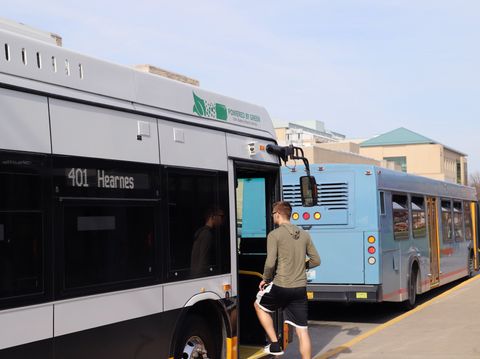
Photo by Runjie Wang
A University of Missouri student steps onto a Go CoMo bus, Columbia’s public transit system, outside of the MU Student Center on Friday, April 27, 2018. The company is now using electric buses that are 100 percent battery-powered and release no emissions. This effort is Missouri’s first electric fleet and was implemented in December 2015, according to the Go CoMO website.
